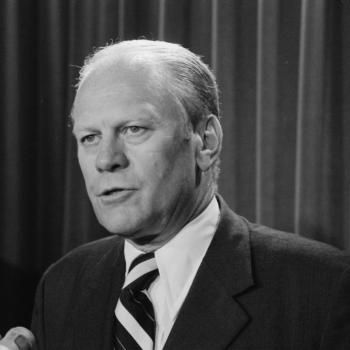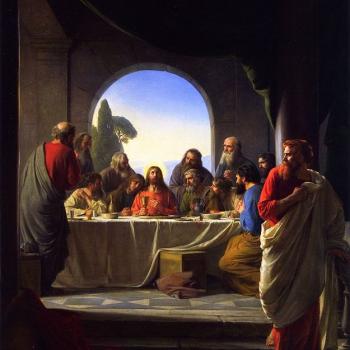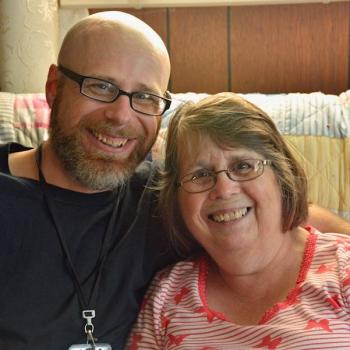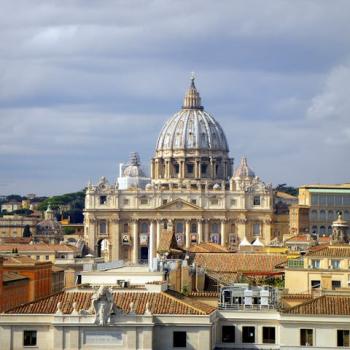And then again, at the Last Supper, on the night he was betrayed:
Now, as they were eating, Jesus took bread, and blessed, and broke it, and gave it to the disciples and said, "Take, eat; this is my body." And he took a cup, and when he had given thanks he gave it to them, saying, "Drink of it, all of you; for this is my bloodof the covenant, which is poured out for many for the forgiveness of sins." (Matthew 26:26-28)
What is the meaning of these strange words? What did Jesus mean when he told his Jewish listeners in the synagogue that they had to eat his flesh and drink his blood in order to have eternal life? And what did he mean when he told his Jewish disciples that the bread of the Last Supper was his "body" and the wine was his "blood"? Why did he command them to eat and drink it?
We'll explore these questions and many others throughout this book. For now, I simply want to point out that the history of Christianity reveals dozens of different responses. Over the centuries, most Christians have taken Jesus at his word, believing that the bread and wine of the Eucharist really do become the body and blood of Christ. Others, however, especially since the time of the Protestant Reformation in the 1500s, think that Jesus was speaking only symbolically. Still others, such as certain modern historians, deny that Jesus could have said such things, even though they are recorded in all four Gospels and in the writings of Saint Paul (see Matthew 26:26-29; Mark 14:22-25; Luke 22:14-30; John 6:53-58; 1 Corinthians 11:23-26).
The reasons for disagreement are several. First of all is the shocking nature of Jesus' words. How could anyone, even the Messiah, command his followers to eat his flesh and drink his blood? As the Gospel of John records, when Jesus' disciples first heard his teaching, they said, "This is a hard saying, who can listen to it?" (John 6:60). Jesus' words were so offensive to their ears that they could barely listen to him. And indeed, many of them left him, and "no longer walked with him" (John 6:66). And he let them go. From the very beginning, people found Jesus' command to eat his body and drink his blood extremely offensive.
Another reason for disagreement is somewhat more subtle. Even if Jesus was speaking literally about eating his flesh and drinking his blood, what could such a command even mean? Was he talking about cannibalism—eating the flesh of a human corpse? While there is no explicit commandment against cannibalism in the Jewish Bible, it was certainly considered taboo. Again, the Gospels bear witness to this reaction. "The Jews then disputed among themselves, saying, 'How can this man give us his flesh to eat?'" (John 6:52). This is a good question, and it deserves a good answer.
Perhaps the strongest objection to Jesus' words comes from Jewish Scripture itself. As any ancient Jew would have known, the Bible absolutely forbids a Jewish person to drink the blood of an animal. Although many Gentile religions considered drinking blood to be a perfectly acceptable part of pagan worship, the Law of Moses specifically prohibited it. God had made this very clear on several different occasions. Take, for example, the following Scriptures:
Every moving thing that lives shall be food foryou. . . . Only you shall not eat flesh with its life, thatis, its blood. (Genesis 9:3-4)
If any man of the house of Israel or of the strangers that sojourns among them eats any blood, I will set my face against that person who eats blood, and will cut him off from among his people. For the lifeof the flesh is in the blood; and I have given it for you upon the altar to make atonement for your souls; for it is the blood that makes atonement, by reason of its life. Therefore I have said to the people of Israel, No person among you shall eat blood, neither shall any stranger who sojourns among you eat blood. (Leviticus 17:10-12)
You may slaughter and eat flesh within any of your towns, as much as you desire. . . . Only you shall noteat the blood; you shall pour it out upon the earth like water. (Deuteronomy 12:16)
Brant Pitre talks with Patheos about Jesus and the Jewish Roots of the Eucharist.
Additional review and discussion of the book.




